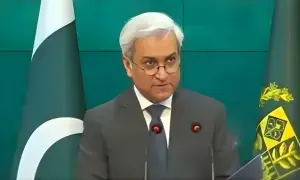Editorial: The passing of Justice Siddiqui
 -File Photo
-File PhotoGovernor of Sindh and former Chief Justice of Pakistan Justice Saeed-uz-Zaman Siddiqui passed away on Wednesday after just two months in office - the shortest period anyone has served in that position and in a sharp contrast to his longest serving predecessor.
In poor health, he spent much of this brief tenure in a hospital or a medical facility within the governor's mansion, unable to perform his duties. Health issues and time did not allow Justice Siddiqui to stamp any distinctive mark as the holder of the province's highest office. But he had already earned much respect as man of courage of convictions who could speak truth to power.
Justice Siddiqui had distinguished himself as a leader of the bar, Chief Justice of the Sindh High Court and a judge of the Supreme Court, before assuming the highest judicial office. Soon enough, he was to face a big test when merely three months into office as Chief Justice of Pakistan (CJP), General Pervez Musharraf staged a coup against the democratically-elected government of the then prime minister Nawaz Sharif. Like military dictator General Ziaul Haq before him, General Musharraf wanted to legitimise his rule by seeking the apex court's endorsement of his extra-constitutional action, requesting Justice Siddiqui for support; he refused to oblige.
He surely knew the consequences of defying a military dictator, yet stayed steadfast in his principled position. Musharraf then decided to issue the infamous Provisional Constitution Order, asking all members of the higher judiciary to take a fresh oath under the PCO excluding justice Siddiqui and certain other judges. He was put under house arrest until one of his senior colleagues took oath as the new CJP in January 2000. Justice Siddiqui thus lost the highest position any judge would dream of, but it was a loss that won him a badge of honour in the public eye that he could proudly wear for the rest of his life. Sadly for his former colleagues, they not only accepted the PCO but also handed the military ruler the power to amend the Constitution - something even the apex court had no power to do.
Like most people in positions of authority, his career was not without controversy. His detractors often accuse him of dividing the judiciary in leading a revolt against the then CJP, Sajjad Ali Shah, who had fallen afoul of PM Nawaz Sharif. But he would defend his position arguing that Justice Shah's appointment was violative of the Constitution, and that he was not alone in questioning the appointment which, he insisted, was made disregarding the seniority rule. And further that the decision in the case was not his alone, but of a 10-member bench.
Whether or not his critics have a valid basis to blame him for playing a role in CJP Shah's dismissal, Justice Siddiqui found himself courted by Nawaz Sharif, who nominated him as his party's candidate for president against PPP's Asif Ali Zardari. He was to be defeated as the numbers game was heavily tilted against an opposition candidate. His chance to hold a public office would come towards the fag end of his life, leaving one to wonder had he had more time what his leadership would have been like as the Governor of Sindh. -Business Recorder
















Comments are closed on this story.